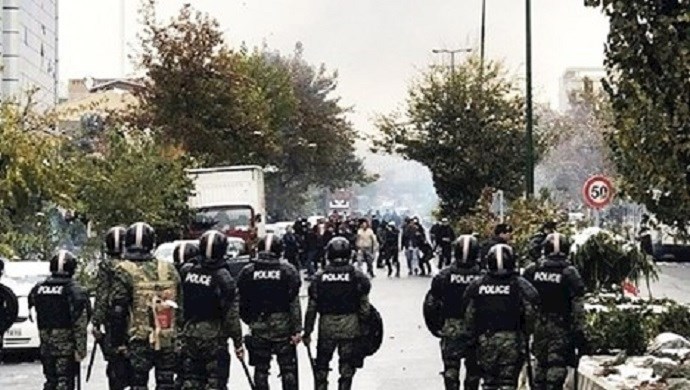Analysis by PMOI/MEK
Iran, November 3, 2020—November 2019 saw the biggest nationwide uprising in Iran since the 1979 revolution, which saw the mullahs rise to power. The protests, which spread to more than 190 cities and lasted for several days, shook the foundations of the mullahs’ rule. Iranian authorities only managed to quell the protests through sheer force and the murder of 1,500 protesters. But the feelings of resent and outrage remain deeply rooted in the Iranian population, especially since the and as the first anniversary of the uprising nears, Iran’s rulers are afraid of the resurgence of a new wave of protests.
These fears manifest themselves in remarks made by Iranian officials and measures taken by security forces across the country.
On Monday, Ebrahim Raisi, the criminal chief of the regime’s judiciary, said, “Security is a fundamental issue. We will not allow the country’s security to be compromised at any cost. Some want to compromise the people’s security through corruption and evil acts… Security officials, police forces, and judiciary officers must not allow any evil to take root.”
Mohammad Jaffar Montazeri, the attorney general of the regime, said, “Dealing with thugs is among the strategic policies of the judiciary, and we must deal this phenomenon that has targeted the security of the society. Some might have been tasked with causing insecurity in the society, and therefore the judiciary is tasked to support the state security forces.”
Other security officials have been boasting about making widespread arrests in the past months. At the same time, security forces are showing increasingly aggressive behavior toward the public. In the past month alone, security forces have tortured and murdered several youths in the streets and at the time of their arrest.
October 24 – Mashhad, northeast #Iran
A young man was tortured and killed by the police. His hands were chained to a pole and a police officer used a shocker and pepper spray on him several times. He died of suffocation in a police vehicle, according to a family member. pic.twitter.com/owHjaJp6g5— People’s Mojahedin Organization of Iran (PMOI/MEK) (@Mojahedineng) October 25, 2020
In tandem, the regime has launched a wave of public humiliation, in which they bring arrested persons to the streets and beat them in front of crowds. All of these measures coincide with the nearing anniversary of the November 2019 protests.
Fear of organized protests
One other factor that keeps the Iranian regime worried is the increasingly organized protests movements by the MEK that are taking root in Iran. On October 31, Gholamreza Jalali, the head of the regime’s Civil Defense Organization, said on the state-run television, “Last year’s riots were organized in social networks. When the people came to the streets, they were already organized… Foreign social networks organized, trained, and guided the people.”
Jalali’s comments echo remarks made by other security officials at the time of the protests, who expressed fear over the organized nature of the protests.
And even though the regime completely shut down the internet for several days, it did not manage to fully cut off the organizational structure of the protests without resorting to violent measures. This further proved the organized nature of the resistance movement inside Iran.
Using Covid-19 as a tool for repression
The regime tried to bank on the coronavirus outbreak as a parameter that will discourage the people from congregating for protests. Regime supreme leader Ali Khamenei even referred to it as a “divine blessing.”
But ongoing labor protests across the country and the activities of the Resistance Units have dismayed the mullahs, proving once again that the desire for change in Iran is so great that not even a pandemic can stop it.
In recent weeks, the regime has resorted to new measures to take advantage of the Covid-19 outbreak to further strengthen its hold on power. While the spread of the virus continues to take its toll on the national health and has placed Iran among the worst-hit countries, the regime is not taking the necessary measures to protect the population. Instead, it is trying to leverage the situation and use it as a pretext to implement new repressive measures on the cusp of the anniversary of the November 2019 uprising.
On November 1, Iraj Harirchi, the regime’s health minister, blamed the spread of the virus on the people and said on national television, “We can’t carry out our work through recommendations. Previously, the health ministry had no executive leverage to control the virus, but now a garrison has been set up under the command of the interior ministry and the secretary of the Supreme National Security Council.”
The garrison in question, was set up with under the order of Khamenei, and is controlled by the State Security Forces and the basij, whose main mission is to quell protests.
Hossein Salami, the head of the Revolutionary Guards (IRGC), also chimed in and declared plans to do a home-by-home search to find coronavirus cases. “As a part of a national plan, a door-to-door operation will go underway in search of the coronavirus carriers. We will attack the places where the coronavirus has settled or spread,” Salami said, according to a report by the state-run Khabar Online on October 31.
What all of this proves is that the immense efforts the regime has undertaken since last November to quell the spirit of rebellion and protest have failed. As we approach the anniversary of the uprising, the regime’s leaders are increasingly nervous and afraid of their own shadow. And their efforts to contain the explosive state of the society are proving to be less effective by the day.





